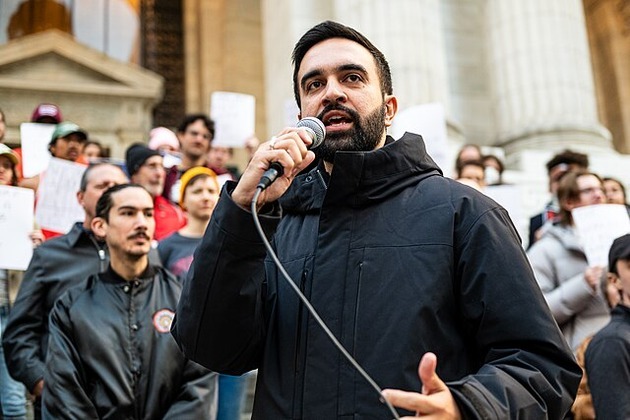Calls for U.S. government to go virtual after lawmakers fall ill
Voice of America
20 Mar 2020, 02:05 GMT+10

- Two members of the U.S. House of Representatives announced late Wednesday they have tested positive for the coronavirus.
- Rep. Mario Diaz-Balart, a Republican from Florida, and Rep. Ben McAdams, a Democrat from Utah, confirmed they have the virus.
- McAdams told NBC's Today show that while he was not in contact with many members, the "few members that I had contact with in that period probably should be quarantined."
Two members of the U.S. House of Representatives announced late Wednesday they have tested positive for the coronavirus, prompting a question that once would have been unthinkable: Why can't Congress work remotely?
Rep. Mario Diaz-Balart, a Republican from Florida, and Rep. Ben McAdams, a Democrat from Utah, confirmed they have the virus. Both men had been on the House floor during voting last Friday.
McAdams told NBC's Today show that while he was not in contact with many members, the "few members that I had contact with in that period probably should be quarantined."
The news prompted several members of Congress to self-quarantine and to call on the nation's premier legislative body to move urgently to modernize an outdated system of doing their work.
The main stumbling block to change is a long-standing rule that House and Senate members must be present in their respective chambers to cast a vote. They cannot phone it in or leave their proxy.
"Why is it required that we be physically present on the floor closer to one another than perhaps we should be at this moment of a public health crisis?" Democratic Senator Dick Durbin of Illinois said on the Senate floor Thursday. Along with Republican Senator Rob Portman of Ohio, Durbin has introduced a proposal that would push the U.S. Senate into working remotely.
"Yes, it is new. Yes it is different," Durbin acknowledged. "Yes, it reflects the 21st century and reflects a challenge the likes of which we've never seen. Tomorrow that challenge, maybe another public health crisis, some other national emergency, or maybe even a terrorist attack? Shouldn't we be ready to make sure the Senate can still do its business?"
Call for change
Rep. Katie Porter, a Democrat from California, was one of the first to call for a change to the House rules last week.
"I was elected to do a job that includes voting on policies to help working families," Porter tweeted. "Remote voting would enable Congress to do its job during this public health crisis & model the behavior we're asking of businesses. Leaders of both parties should act now to get this done."
Porter is one of three lawmakers who initiated a request to House Speaker Nancy Pelosi to make a rule change for remote voting in emergencies.
"While Congress is an institution with a proud history, we cannot stand on tradition if it puts lives - and our ability to be the voice of our constituents - at risk," Porter wrote along with Democratic Rep. Eric Swalwell of California and Republican Rep. Van Taylor of Texas.
But so far, both Pelosi of California and Senate Majority Leader Mitch McConnell of Kentucky have dismissed the possibility of both chambers recessing during the crisis, citing Congress' need to be in session to push through emergency health and economic assistance.
"Neither the speaker nor myself are of the belief that voting offsite is something that we want to pursue. We just think it establishes a very bad precedent and could create all kinds of problems, and we don't want to pursue that," House Majority Leader Steny Hoyer said during a March 11 reporter briefing.
The U.S. Congress considered contingency plans following the Sept. 11, 2001, terrorist attacks but never adopted an option that would continue lawmakers' work in the event mass gatherings in Washington were no longer possible.
Staffers in Capitol Hill offices have already begun working remotely. But centuries-old rules prevent their bosses from performing the most important function of their jobs - approving legislation and spending measures - unless they are in direct contact with each other, in a large gathering. As millions of people across the United States move to teleworking to help contain the spread of the virus, the nation's lawmakers are still working right alongside each other.
Capitol Hill thrives on personal contact in a way that is not possible within other key institutions in the nation's capital. Unlike the White House, the Pentagon or the State Department, lawmakers are always giving impromptu press conferences, talking in the hallways and making themselves accessible to reporters and to each other.
Then there is the issue of voting. Lawmakers have to be physically present in the chamber during voting to have their vote recorded.
Spreading coronavirus
The U.S. Senate instituted a new procedure for voting on Wednesday, giving senators 30 minutes to enter the chamber to record their vote. With just 100 senators, this new approach minimized some of the risk of one member spreading the coronavirus to some of his colleagues. But many of the senators could still be seen lingering in the chamber and talking to each other with much less than the six feet separation required by social distancing. The House could institute similar measures when that chamber comes back into session next week.
Congress also faces unique challenges in terms of containing the virus. The average age of a House member is 58 years old, while the average age of a Senator is 63 years old, with many in their 70s or even 80s. During a normal schedule, lawmakers are only in session about half the week, requiring two flights a week to and from Washington, D.C., to their districts or states. It is a perfect situation to mix and then spread a virus across the entire country.
Legislative bodies in other countries are moving quickly to adapt.
The British parliament - a similarly tradition-bound institution - is mulling changes to the way it operates by allowing simple "for" or "against" votes to avoid packed voting lobbies and holding committees by teleconference. The European Parliament is encouraging its members to stay home, holding a one-day session for members who are already in Brussels and allowing votes by mail for all others.
 Share
Share
 Tweet
Tweet
 Share
Share
 Flip
Flip
 Email
Email
Watch latest videos
Subscribe and Follow
Get a daily dose of Milwaukee Sun news through our daily email, its complimentary and keeps you fully up to date with world and business news as well.
News RELEASES
Publish news of your business, community or sports group, personnel appointments, major event and more by submitting a news release to Milwaukee Sun.
More InformationInternational
SectionAlleged Kirk assassin surrenders, taken into custody
WASHINGTON, DC - U.S. Federal authorities have arrested and charged 22-year-old Tyler Robinson, a third-year apprentice electrician, ...
Mamdani urges FIFA to cap ticket prices ahead of 2026 World Cup
NEW YORK CITY, New York: New York mayoral candidate Zohran Mamdani is taking his affordability crusade beyond rent and transit, this...
After the raid, Seoul says US visa hurdles could stall Korean projects
SEOUL, South Korea: South Korea's president warned that Korean companies may think twice before expanding in the United States unless...
After 800 years, ancient pipe organ plays again in Jerusalem monastery
JERUSALEM, Israel: After lying silent for nearly eight centuries, what experts believe to be the oldest surviving pipe organ in the...
France faces turmoil as Lecornu takes over as prime minister
PARIS, France: French President Emmanuel Macron has appointed Sébastien Lecornu, a close political ally and former defense minister,...
Undersea cable cuts hit connectivity in Africa, Asia, Middle East
DUBAI, U.A.E.: A ship is believed to have accidentally severed key internet cables in the Red Sea, disrupting online access across...
Wisconsin
SectionBrewers' Quinn Priester beats Cardinals to extend win streak
(Photo credit: Michael McLoone-Imagn Images) Christian Yelich hit a two-run homer and Quinn Priester pitched 5 1/3 effective innings...
Walker Buehler's Phillies debut leads to rout of Royals
(Photo credit: Bill Streicher-Imagn Images) Walker Buehler allowed one run in five innings in his debut for the Philadelphia Phillies,...
Bears coach Ben Johnson aims for first win vs. Lions, his former team
(Photo credit: David Banks-Imagn Images) The Detroit Lions looked lost in their season opener without their former offensive mastermind....
Report: Commanders DE Deatrich Wise (quad) out for season
(Photo credit: Amber Searls-Imagn Images) Washington Commanders defensive end Deatrich Wise will miss the remainder of the season...
Report: Wofford fires head coach Dwight Perry
(Photo credit: Aaron Doster-Imagn Images) Wofford has parted ways with head coach Dwight Perry after three seasons, The Field of...
Agent: Malcolm Brogdon agrees to 1-year contract with Knicks
(Photo credit: Reggie Hildred-Imagn Images) The New York Knicks are signing free-agent guard Malcolm Brogdon to a one-year contract,...













